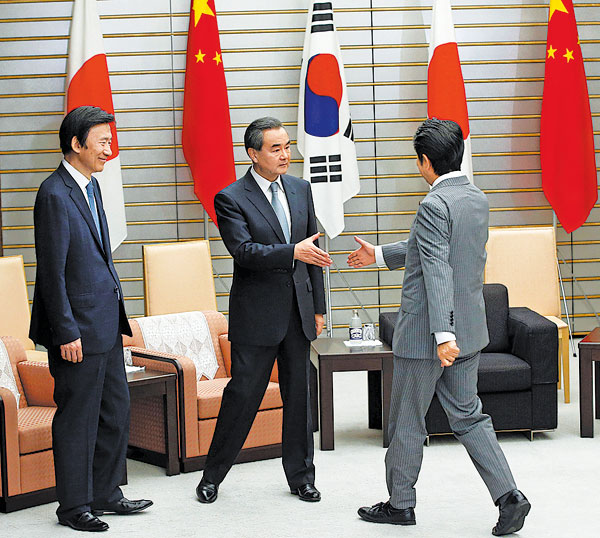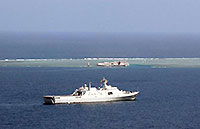Pyongyang's nuclear plan opposed
By ZHANG YUNBI,CAI HONG (China Daily) Updated: 2016-08-25 01:20
China outlines its position after the DPRK test-fires missile launched from submarine
 |
|
Japanese Prime Minister Shinzo Abe (right) greets Chinese Foreign Minister Wang Yi (center) and Republic of Korea Foreign Minister Yun Byungse at their meeting in Tokyo on Wednesday.[Photo/Agencies] |
China opposes the Democratic People's Republic of Korea's nuclear development program, Foreign Minister Wang Yi said on Wednesday after an annual meeting with counterparts from Japan and the Republic of Korea.
The DPRK test-fired a submarine-launched ballistic missile on Wednesday morning before the long-awaited meeting between Wang, Japan's Fumio Kishida and the ROK's Yun Byung-se in Tokyo.
Wang said China will continue to strive for a nuclear-free Korean Peninsula and persist in settling such issues through dialogue and consultation.
The test was made after Pyongyang said on Monday it would launch a "pre-emptive nuclear strike" against the ongoing annual US-ROK military exercise scheduled for Monday to Sept 2.
The missile test was the latest in a series of launches by Pyongyang in defiance of United Nations Security Council resolutions.
Wang said China opposes any words and deeds that cause tensions on the Korean Peninsula and all actions that violate Resolution 2270, which was passed unanimously by the Security Council on March 2 to expand the scope of sanctions against the DPRK.
Zhang Liangui, an expert on Korean studies at the Party School of the Central Committee of the Communist Party of China, said Wednesday's missile launch provided a new topic for the trilateral meeting.
The comments made by the three key diplomats — mostly reaffirming their official positions — are "still of value".
Wang's message is that although Beijing is angry at Seoul's plan to introduce the powerful Terminal High Altitude Area Defense antimissile system, which may technically put part of China under the system's radar, "China has not changed its position on the Korean Peninsula nuclear issue", Zhang said.
Addressing trilateral cooperation, Wang said that China, Japan and the ROK — three large economies — should shoulder important responsibilities in promoting East Asia's economic development, and maintaining peace and stability.
Wang said the three countries need to accumulate political mutual trust, conduct pragmatic cooperation, enhance people-to-people exchanges and promote sustainable development.
Kishida and Yun said their countries support China in its efforts to make the G20 Leaders Summit in Hangzhou, Zhejiang province, on Sept 4 and 5 a success.
Wang urged East Asian nations to play up the leading roles played by China, Japan and the ROK to realize an East Asia Economic Community and facilitate the building of an "Asian Community of Shared Fate".
The diplomats agreed to accelerate talks on a free trade agreement among their countries and to ensure that negotiations on a Regional Comprehensive Economic Partnership are completed in September as scheduled.
Feng Wei, a professor of Japanese studies at Fudan University in Shanghai, said the three countries started to deliberate on setting up the trilateral free trade area early in 2002, but this has yet to take shape because of many factors.
Contact the writers at caihong@chinadaily.com.cn
- DPRK's renovated central zoo attracts thousands of visitors every day
- DPRK test-fires submarine-launched ballistic missile
- War games stir new DPRK, ROK tensions
- DPRK warns of preemptive strikes as US-ROK war games kick off
- ROK, US kick off joint annual war game despite DPRK's backlashes
- DPRK says deputy ambassador to UK fled to escape punishment







